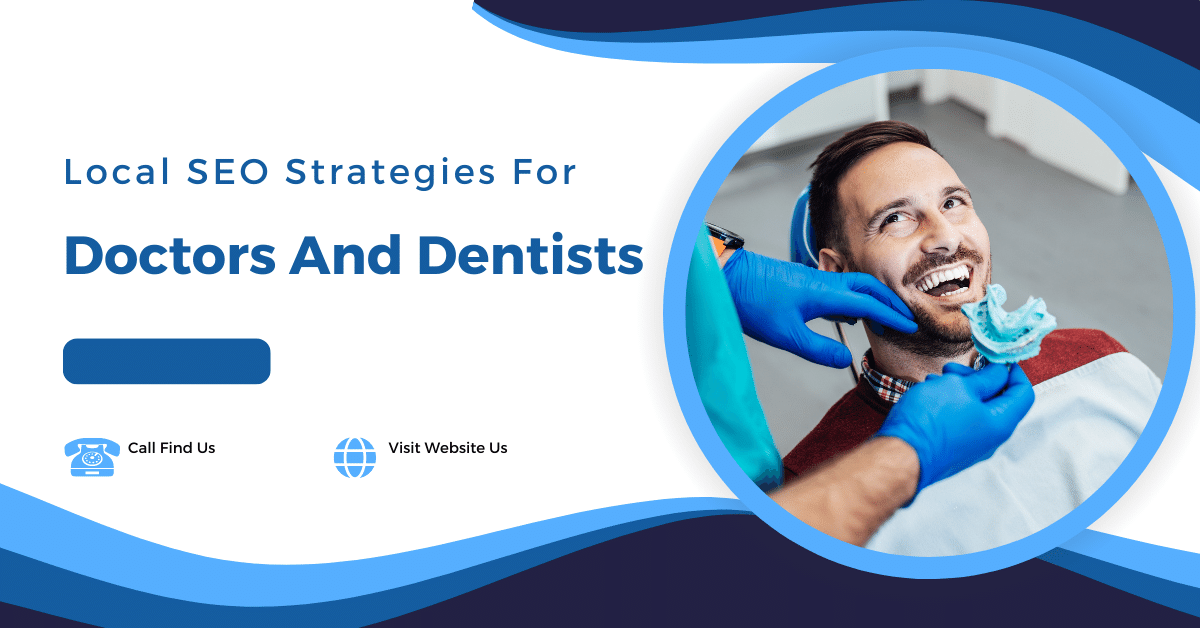SEO
10 Local SEO Strategies For Doctors And Dentists
Introduction
Welcome to our comprehensive guide on 10 Local SEO Strategies for Doctors and Dentists. In today’s digital age, it is crucial for healthcare professionals to have a strong online presence to attract and retain local patients. By implementing effective local SEO strategies, doctors and dentists can optimize their websites and increase their visibility in search engine results. In this article, we will explore ten powerful strategies that can help medical practitioners improve their online visibility, attract more patients, and grow their practice.
Table of Contents
- Optimize Your Website for Local Keywords
- Create Unique and Engaging Content
- Leverage Online Directories
- Optimize Google My Business Listing
- Earn High-Quality Backlinks
- Encourage Online Reviews
- Utilize Social Media Platforms
- Mobile Optimization
- Improve Website Loading Speed
- Monitor and Analyze Performance
1. Optimize Your Website for Local Keywords <a id=”section1″></a>
To effectively target your local audience, it’s essential to optimize your website with relevant local keywords. These are phrases that potential patients in your area are likely to use when searching for medical services. Conduct thorough keyword research to identify these keywords and strategically incorporate them into your website’s content, meta tags, headings, and URLs.
For example, if you’re a dentist in Los Angeles, include keywords like “Los Angeles dentist,” “dentist near me,” and “dental clinic in Los Angeles” throughout your website. By doing so, search engines will understand the geographic relevance of your website and rank it higher in local search results.
2. Create Unique and Engaging Content <a id=”section2″></a>
Content is a vital component of any SEO strategy. Develop unique and informative content that educates and engages your audience. Write blog posts, articles, and guides related to various healthcare topics that your patients may find interesting. Incorporate relevant local keywords naturally within your content to boost its visibility in search engine results.
For instance, you can create blog posts about “The Importance of Regular Dental Check-ups for Los Angeles Residents” or “Common Cold and Flu Prevention Tips for New York City Families.” By producing valuable content, you establish yourself as an authority in your field and attract more patients to your website.
3. Leverage Online Directories <a id=”section3″></a>
Online directories play a significant role in local SEO for doctors and dentists. Claim and optimize your listings on popular directories such as Yelp, Healthgrades, and Vitals. Ensure that your business name, address, and phone number (NAP) are consistent across all directories. Additionally, include a compelling description, relevant categories, and high-quality images.
Being listed in reputable directories enhances your online credibility and increases your chances of appearing in local search results. Furthermore, it allows potential patients to find essential information about your practice, such as operating hours, services offered, and patient reviews.
4. Optimize Google My Business Listing <a id=”section4″></a>
Google My Business (GMB) is a powerful tool for local SEO. Claim and optimize your GMB listing to improve your online visibility. Provide accurate and up-to-date information about your practice, including your address, phone number, website URL, and business hours. Choose relevant categories and add high-quality images that showcase your facilities and staff.
Encourage patients to leave reviews on your GMB listing. Positive reviews not only boost your search rankings but also build trust and credibility among potential patients. Respond promptly to reviews, both positive and negative, to demonstrate your commitment to patient satisfaction.
5. Earn High-Quality Backlinks <a id=”section5″></a>
Backlinks from authoritative and relevant websites can significantly impact your local SEO efforts. Focus on acquiring high-quality backlinks from trustworthy sources such as local medical associations, healthcare organizations, and reputable publications. Reach out to these organizations and offer to contribute guest articles or collaborate on informative healthcare content.
Additionally, create valuable content that naturally attracts backlinks. Publish research studies, case studies, or expert opinion pieces that other websites would want to reference. The more high-quality backlinks you have, the higher your website’s authority and visibility will be in search engine results.
6. Encourage Online Reviews <a id=”section6″></a>
Online reviews are crucial for doctors and dentists to build trust and attract new patients. Encourage your satisfied patients to leave positive reviews on platforms such as Google, Yelp, and Healthgrades. These reviews act as social proof and can influence potential patients’ decisions when choosing a healthcare provider.
To increase the number of reviews, you can politely ask your patients to share their experience after their visit. You can also add links to your review profiles on your website and email signatures, making it easier for patients to leave reviews. Remember to respond to reviews, both positive and negative, in a professional and empathetic manner.
7. Utilize Social Media Platforms <a id=”section7″></a>
Social media platforms provide excellent opportunities for doctors and dentists to engage with their local community and share valuable healthcare information. Create profiles on popular platforms such as Facebook, Instagram, Twitter, and LinkedIn. Share informative content, health tips, patient success stories, and updates about your practice.
Engage with your audience by responding to comments, messages, and inquiries promptly. Social media interactions can help build strong relationships with potential patients and establish your practice as a trusted source of healthcare information in your local area.
8. Mobile Optimization <a id=”section8″></a>
In today’s mobile-driven world, it’s crucial to optimize your website for mobile devices. Ensure that your website is mobile-friendly and provides a seamless user experience across different screen sizes. Mobile optimization improves your website’s visibility in mobile search results and enhances the user experience for patients who access your site on their smartphones or tablets.
Consider using responsive design, optimizing page load speed, and optimizing images for mobile devices. By prioritizing mobile optimization, you can attract and retain mobile users, who are increasingly searching for healthcare services on their smartphones.
9. Improve Website Loading Speed <a id=”section9″></a>
Website loading speed is a critical factor in both user experience and search engine rankings. A slow-loading website can lead to high bounce rates and negatively impact your SEO efforts. Optimize your website’s loading speed by compressing images, minifying CSS and JavaScript files, and leveraging browser caching.
Regularly monitor your website’s loading speed using tools like Google PageSpeed Insights or GTmetrix. Identify and fix any issues that may be slowing down your site to ensure a seamless and fast browsing experience for your visitors.
10. Monitor and Analyze Performance <a id=”section10″></a>
Monitoring and analyzing your website’s performance is essential to measure the effectiveness of your local SEO strategies. Use tools like Google Analytics and Google Search Console to track important metrics such as organic traffic, user behavior, keyword rankings, and website errors.
Regularly review these metrics to identify areas for improvement and optimize your strategies accordingly. Analyzing your performance allows you to make data-driven decisions and continuously refine your local SEO efforts to achieve better results.
Frequently Asked Questions (FAQs)
Q1: How long does it take to see results from local SEO strategies for doctors and dentists?
A1: The time it takes to see results from local SEO strategies can vary depending on various factors such as competition, the effectiveness of the strategies implemented, and the overall online presence of your practice. Generally, it can take several months to start seeing noticeable improvements in search rankings and organic traffic. Consistency and ongoing optimization are key to achieving long-term success.
Q2: Are online reviews really important for doctors and dentists?
A2: Yes, online reviews are crucial for doctors and dentists. They act as social proof and influence potential patients’ decisions when choosing a healthcare provider. Positive reviews build trust and credibility, while negative reviews present an opportunity for improvement and showcase your commitment to patient satisfaction. Encourage your satisfied patients to leave reviews and respond to reviews in a professional and empathetic manner.
Q3: Can social media platforms help doctors and dentists attract more patients?
A3: Absolutely! Social media platforms provide a powerful channel for doctors and dentists to engage with their local community and attract more patients. By sharing valuable healthcare information, success stories, and updates about your practice, you can build strong relationships with potential patients and establish your practice as a trusted source of healthcare information. Engage with your audience, respond to comments and inquiries, and leverage the reach and targeting capabilities of social media platforms to connect with your local audience effectively.
Q4: How can I improve my website’s loading speed?
A4: Improving website loading speed involves several optimization techniques. Start by compressing images to reduce their file sizes without compromising quality. Minify CSS and JavaScript files by removing unnecessary characters, white spaces, and comments. Leverage browser caching to store certain elements of your website in a visitor’s browser, reducing the need to load them with each visit. Additionally, choose a reliable and fast web hosting provider and consider using a content delivery network (CDN) to distribute your website’s content across multiple servers worldwide.
Q5: Why is mobile optimization important for doctors and dentists?
A5: Mobile optimization is essential for doctors and dentists because a significant portion of potential patients use their smartphones to search for healthcare services. Optimizing your website for mobile devices ensures a seamless user experience and improves your website’s visibility in mobile search results. By providing a mobile-friendly website, you can attract and retain mobile users, who often seek immediate healthcare information and services on their smartphones.
Q6: How can I monitor the performance of my local SEO strategies?
A6: Monitoring the performance of your local SEO strategies involves using tools like Google Analytics and Google Search Console. Google Analytics provides valuable insights into organic traffic, user behavior, and conversions on your website. Google Search Console helps you track keyword rankings, identify website errors, and submit sitemaps for better indexing. Regularly review these metrics and make data-driven decisions to optimize your strategies and achieve better results.
Conclusion
Implementing effective local SEO strategies is crucial for doctors and dentists to establish a strong online presence, attract more patients, and grow their practice. By optimizing their websites for local keywords, creating valuable content, leveraging online directories, optimizing Google My Business listings, earning high-quality backlinks, and encouraging online reviews, medical practitioners can significantly improve their online visibility and credibility. Additionally, utilizing social media platforms, prioritizing mobile optimization, improving website loading speed, and monitoring performance are vital for long-term success. Stay consistent, adapt to changes, and continuously optimize your strategies to achieve the goal.

